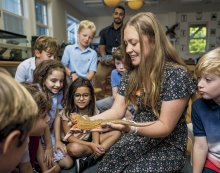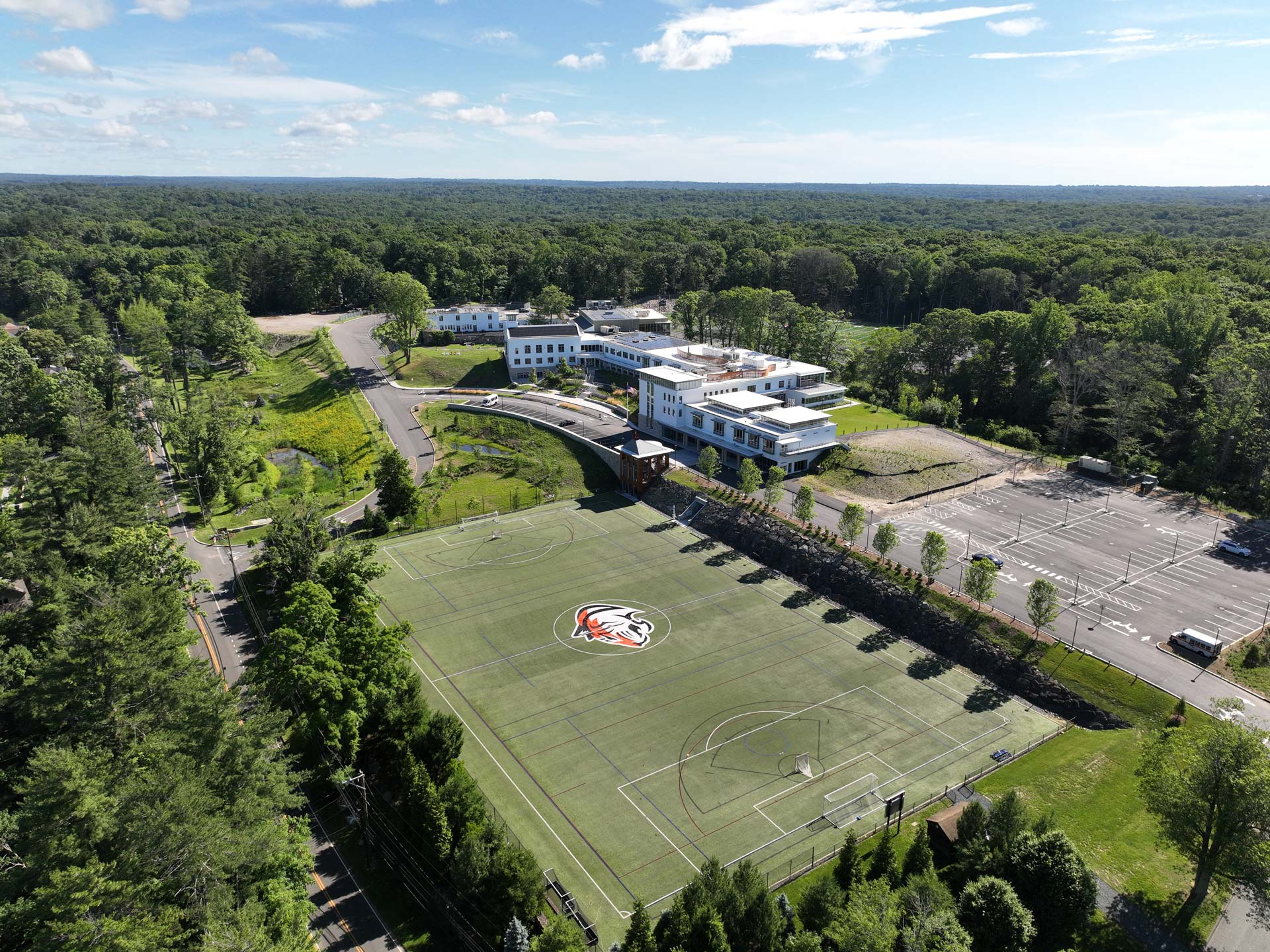
Beth McDonough, Lower Elementary Science Teacher Loves to Watch Things Grow
By Andrew Niblock Director of Schoolwide Initiatives
The Lower Elementary Science House may be the best classroom . . . ever.
The cozy cottage, tucked in between the main Lower Elementary building and the playground, is a space that welcomes curiosity and sparks the creativity that leads to sticky learning. It houses a crowd-pleasing assortment of critters and boasts a floor plan designed to give young scientists the space to get their hands dirty.
Beth McDonough is the lucky teacher who gets to call it home.
Part Willy Wonka and part safari guide, McDonough’s role demands a level of flexibility that is not for the faint of heart but makes for a magical experience for students. On any given day, McDonough might be leading an expedition through the woods and consulting on proper care for the Science House’s myriad creepy crawlies.
Science is a world that embraces wonder, and McDonough, who began her teaching career as a Co-Teacher in the Lower Elementary, is delighted to get to share that world with her students every day.
I had a chance to ask McDonough about the wonders and the stories of science and her teaching.
When did you first think of yourself as a scientist?
When I was in first grade we learned about the three states of matter: solid, liquid, and gas. I remember sitting at a table with my classmates and mixing salt into a cup of water. A solid dissolving into a liquid?! I was absolutely amazed. After we watched the saltwater evaporate upon heating, I thought it was magic. I remember thinking to myself, “Wow, science is really cool!” I now have the honor of teaching my first graders about matter. It is truly a full-circle moment.
What about science inspires you?
Science is an inquiry-based subject. I remember when I taught my first science lesson as a Kindergarten Co-Teacher and fell in love with the natural flow of conversation. Science is one of those subjects in which you can almost see a child’s thought process just from the order of questions they raise.
What inspires me most about science is the learning is never done! One question can lead to a different thought, a great idea, or even another question.
The University of Pennsylvania has recently included a Thank You Note as an essay option for their application. As a scientist and a teacher, who would you write to? Who inspired/inspires you?
What most people don’t know about me is I was an incredibly shy child growing up. I did not like raising my hand in school, and I used to hide behind my parent’s legs at social functions. If I could write a thank you note to anyone, it would have to be my first-grade teacher, Mrs. Rogers. She gave me a special nickname, “Bethy,” and made me feel seen in the classroom. Mrs. Rogers made all of her students feel special, but she truly helped me blossom into a confident student. Her lessons were always engaging and brought out my inquisitive side, encouraging me to keep asking questions. I remember her reading voice, which I love using during science read-alouds, as she introduced us to the Junie B. Jones book series. Most importantly, I would like to thank her for inspiring me to become a teacher. I wanted to be just like her and even practiced teaching with my stuffed animals at home.
I am still in contact with her, and without her I don’t think I would have this love of teaching and lifelong learning. I hope to be a Mrs. Rogers to one of my students and inspire them to do what they love while bringing out their inner confidence.
How do you hope students enter the Science House?
Each day I hope my students enter eager to learn, question, and explore. The Science House is an incredibly special space that was built to foster inquiry and I feel so lucky that I get to teach in it.
How do you hope students leave the Science House?
My hope is that students leave with a love of science that carries with them throughout their time at GCDS and beyond. This is the first science “classroom” students enter, and I hope they bring their confidence as young scientists with them upon entering the Upper Elementary School.
What role can science play in a child’s learning adventure?
Science plays a huge role in a child’s learning adventure! Scientific learning incorporates that 3D experience of seeing, doing, and understanding. I try to weave in hands-on activities during every lesson I teach. These experiences spark questions while causing students to lean into their problem-solving skills, such as working with their lab table partners, sharing lab responsibilities, and tuning in to their inquisitive side. Science is one of the pieces that fits into the GCDS puzzle!
Why do you teach?
I teach because I love watching things grow. Seeds that turn into plants and students who turn into scientists. What inspires me most about science is the learning is never done! One question can lead to a different thought, a great idea, or even another question.”
#GCDSLES














.JPG&command_2=resize&height_2=85)





